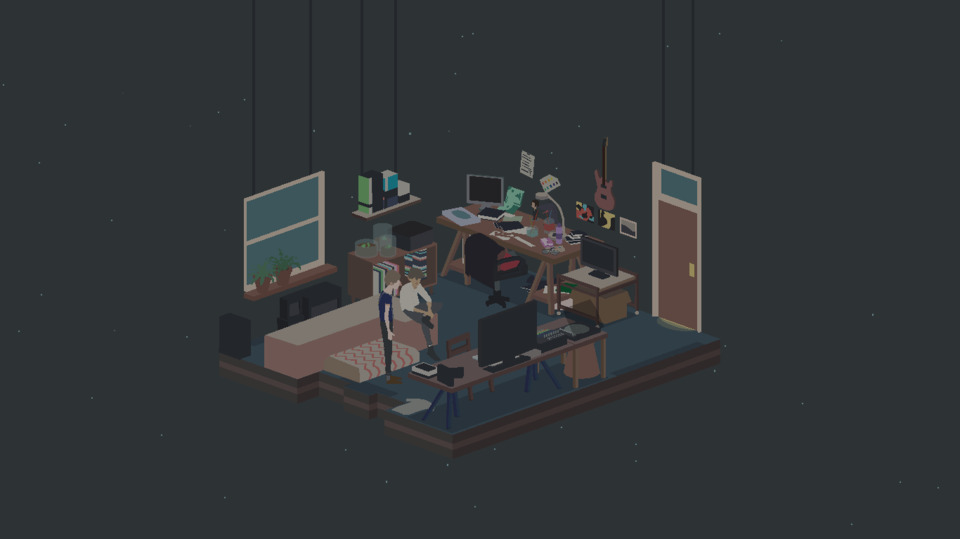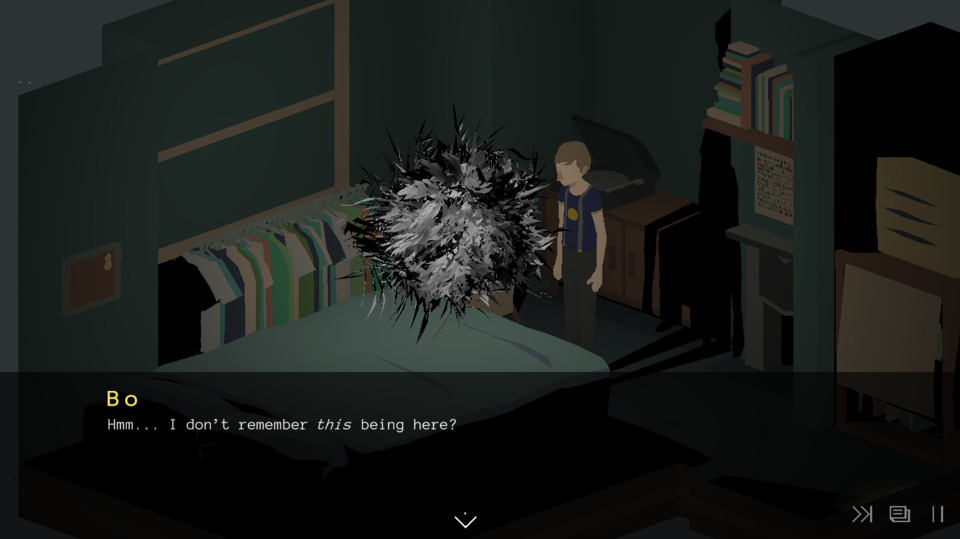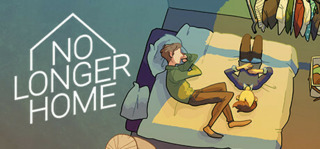
- Game: Humble Grove's No Longer Home.
- Release Month: July.
- Quick Look: N/A.
- Started: 19/01.
- Completed: 19/01.
Becoming an adult is one of those difficult things that's foisted upon us all by the irritating phenomenon known as the inexorable march of time. I've played more than a few games about this process, with its young authors and designers naturally drawing from their own experiences and giving it the merest veneer of fictionalization. A popular, semi-recent example would be something like Night in the Woods: a game that certainly has its supernatural indulgences but is ultimately about growing up, and growing apart from former friends and a childhood that is rapidly receding into memory. Moving slightly closer to the present, we have the likes of Kentucky Route 0 putting a Lynchian spin on the main living miseries: a game about having no particular destination in mind besides what life throws at you, whether it's as strange as an alternative dimension inspired by text parser games or as entirely quotidian as finding a new job and struggling with crushing medical debt.
No Longer Home, a semi-autobiographical game by the two founders of Humble Grove, takes elements of both the above. The player alternates between its two protagonists - Ao, a non-binary Japanese national studying in London, and Bo, a non-binary native Brit following a similar art degree - as the duo approach a (possibly temporary) end to their romantic union as Ao is forced to return home halfway across the world, and with neither earning money there's little they can do to prevent it. The game has a certain gloominess as a result, as they listlessly explore their beat-down apartment as well as deal with the trepidation that comes with figuring out what to do and where to go next. Lots of meaningful conversations with each other and with their friends and fellow graduates, each going through their own life transitions to pastures old (i.e. their parents' homes) and new. The game's inspirations become overt as soon as you start playing: the simple cel-shaded look that obfuscates faces, the uncanny fashion with which the walls and ceilings pull away during contemplative moments like scenery in a play, the occasional unexplained phenomena and odd non-human NPCs that offer lines of dialogue you wouldn't be certain would make sense even if you had the context behind them: these are all evident stylistic choices brought across from Kentucky Route Zero. As if to assure the audience that these references were deliberate, KR0 itself briefly shows up (as a game-within-a-game, of course) and is mentioned in the post-credits acknowledgements.

Gameplay-wise there's very little, but what little there is does a fine job immersing you in this slightly off-kilter interior world nestled in the heart of London. Players have agency over conversations, picking between several topics and responses that might lead to different dialogue paths but not usually in the sense that you can enrage or impress your dialogue partner: Ao and Bo are fond of each other and understand one another well enough that they're not going to descend into bickering, unless it's a minor disagreement about putting up a shelf or watering the plants. While the game branches constantly through these conversations, it never feels like your choices might lead to a different ending; rather, the point of the game's story is that Ao and Bo will be separated regardless of what happens - that their parting is inevitable. Instead, these branches serve to allow the player to guide conversations and determine, if only slightly, the outlook and personalities of the two protagonists without necessarily dictating who they are. It also adds some replay value, giving the players the tacit option see how alternative conversation paths might go if they choose to ever play No Longer Home again; since the whole game is roughly two hours long, it's not beyond the realm of possibility to play it a handful more times to see everything. Between convos, either character will wander the apartment observing their surroundings with some rueful voiceover about opportunities gone or small things they'll miss about their partner, occasionally speaking to other characters or their two pet cats, until they find the particular trigger that causes time to move forward hours, days, or even weeks to the next scene as the deadline of their (mutually determined) eviction and Ao's departure closes in. Sometimes this trigger will be something unexpected, like an impossible geometric shape hovering above the bed or a bathtub full of whirling galaxies.
My primary issue with No Longer Home is, not surprisingly, similar to the criticisms I had of Kentucky Route 0 back when I reviewed it in 2020. Chiefly, that the expression "misery loves company" has always meant, for me at least, that misery propagates itself. You don't become slightly less miserable knowing that others are suffering - it's not "loves company" in that sense - but that it continues to metastasize and grow as you take more of it in from external sources. Ideally, they should be shared only with those in a position to help, but we human beings have a habit of sharing what's on our mind to those willing to listen to see if there's a solution we're missing, or simply desiring an acknowledgement that these problems are genuine and not the exaggerated figments borne of our own warped interiorities. As a result, I really don't care to hear about other people's problems not because I'm incapable of sympathy but because I have a bad habit of taking them to heart and adding to my own woes. Knowing my friends are suffering as bad or worse than myself does very little to cheer me up, as I suppose would be the case with anyone who isn't a solipsistic raging narcissist. When it's fictional people unloading their problems because you hit "Start Game" in a menu, there comes a point where you have to wonder why you're bringing this down onto yourself.

No Longer Home does have merit. It's an intelligently and empathetically written game from the relatable perspective of twenty-somethings who are still trying to find their place in the world, not helped by how cruel and arbitrary it can be and by how irksome it is that so many other people seem to find their groove the instant they step out of their highschool for the final time. The game's slow pace is mitigated by the fact that it's very short, especially if you make a beeline to the scene change triggers, so even if you're exploring the small apartment space for the seventh or eighth time to see what new items there are to look at, it's not going to stretch on and on forever like Night in the Woods or Kentucky Route 0 did towards their endings. It is, however, a game that does my mental state absolutely no favors with its saturnine mood (albeit one that is justifiably and understandably morose, given what's at stake) and musings about the miserable state of the world. And that's taking into account that this all happens long before COVID made the planet that little bit more of a waking nightmare. Video games don't have to exist as pure escapism, and it's for the best that they aren't uniformly that, but that's what I generally prefer out of them these days.
Current 2021 GOTY Ranking:

Log in to comment